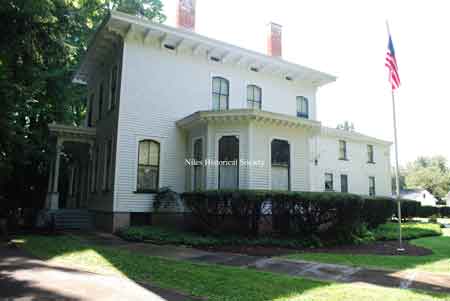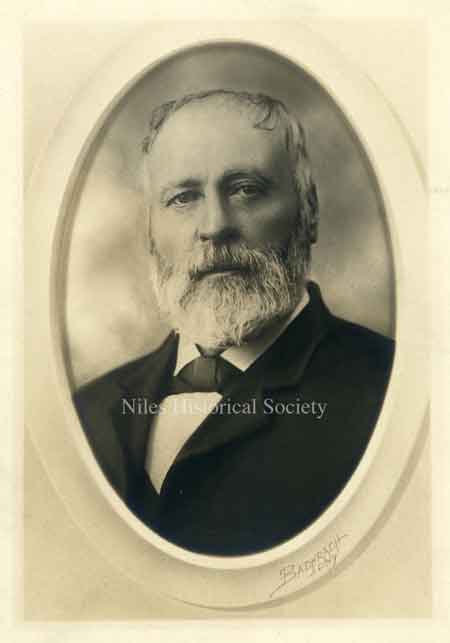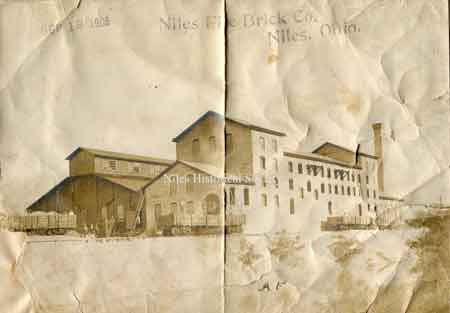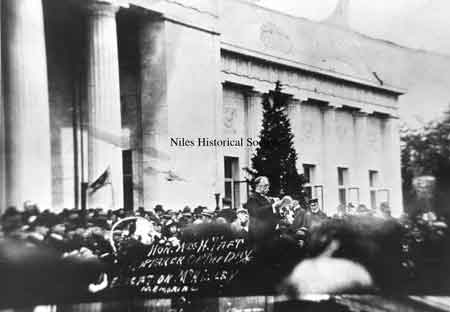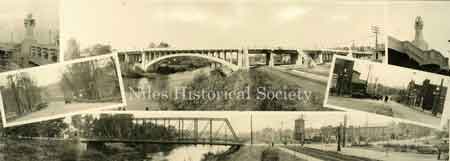Ward-Thomas Museum


Aubrey Thomas
Ward — Thomas
Museum
Home of the Niles Historical Society
503 Brown Street Niles, Ohio 44446
Click here to become a Niles Historical Society Member or to renew your membership
Click on any photograph to view a larger image, click on image again to zoom into photograph.
|
|
Aubrey Thomas 1934 Centennial
Issue of the Niles Daily Times. W. Aubrey Thomas, son of John R. Thomas,
was the organizer of the Mahoning Valley Steel Company. In 1903,
he was the first president of the newly organized Dollar Bank.
After four years there, he resigned his position at the bank to
run for the U.S. Congress. He was the only U.S. congressman from
Niles, and first elected from Trumbull County; he served from
1904-1912 |
|
|
Ward-Thomas Mansion John R. Thomas |
The John R. Thomas family lived in a mansion acquired in 1877(which the family called Brynhyfryd, meaning Pleasant Hills) at 503 Brown Street in what is now the home of the Niles Historical Society. His children included T.E. Thomas, John M. Thomas, W. Aubrey Thomas, Mrs. Margaretta Clingan and Mrs Mary A. Waddell. And Niles is just as quick to claim him as a native son not only for what he accomplished in the industrial and financial world but for his contributions as a former citizen, councilman, and Congressman. “Up until the depression, the John R. Thomas family lived in what is Niles was in a fair way to become a very important and prosperous city,” remarked Mr. Thomas. Naturally, when the depression came industries closed, men were thrown out of employment, and things have not been so cheerful. When I was in Congress there never more loyal, energetic, enthusiastic supporters than the ones I had.” Mr. Thomas smiled with satisfaction as he recalled the W. Aubrey Thomas Marching club which went to Youngstown to compete against clubs from Toledo, Pittsburgh, Cleveland and Youngstown for a large flag. “Our club came home with the flag,” Mr. Thomas concluded. “I always look back with pleasure to the way Niles supported me and I have the warmest feeling for the city, he commented. He expressed regret at being unable to be here for the Centennial Celebration and hopes that it might be happy and successful occasion. The Thomas family always has held an important
place in the industrial development of Niles, John R. Thomas established
the Niles Firebrick Co., and today his son, W. Aubrey, points
with pride to the record which the company has made in withstanding
strenuous periods which saw the failure of several other companies. |
|
|
Thomas Furnace Company was located on the east bank of the Mosquito Creek, south of the Erie RR, it was originally the William Ward and Company, built in 1870. After the failure of the Ward Company. John R. Thomas bought it in 1879 and enlarged it. It was acquired and enlarged again by the Carnegie Steel Co. in 1900 and dismantled in 1925. PO1.512 Niles Firebrick No. 2 PO2.1905 |
When the elder Thomas began with the Thomas Furnace Company, the capacity was 22 tons daily, and at the time the company was sold to U.S. Steel the capacity had increased to 350 tons daily. It was in the furnace company laboratory that W. Aubrey Thomas became chemist after he had finished his training in Rennsselaer Polytechnic Institute in 1890. He had been graduated from the local high school in 1833 and then took preparatory work in Mt. Union College. He served as chemist for two years and then became superintendent of the plant. He was one of the youngest superintendents in this part of the country at that time. John R. Thomas is remembered for his loyalty to Niles. During the later part of his life he served on the council and was succeeded by his son W. Aubrey. It was after the younger Thomas had become a member of the council that Niles was changed from a village to a city. Until that time, the mayor had presided over the meetings. When Niles became a city it was necessary to elect a president. Mr. Thomas was chosen. While he was head of this body the question of paving Main Street came up. During one of the meetings a petition opposing the improvement because of the assessment, signed virtually by every merchant was presented. “I pushed the petition in the stove; the proposed paving was approved and inside of a year there wasn’t one merchant who would have given up the pavement for twice what it cost,“ Mr. Thomas relates. The first sewage system and the first water works were inaugurated while he was a councilman. Evidence of great general improvement in the city, Mr. Thomas finds, in the fact that when he was in council it was a fight even to get good sidewalks. |
|
| |
||
|
The Honorable William Howard Taft was the main speaker at the dedication of the McKinley Memorial on October 5, 1917. When the charter for the Memorial was obtained, by an Act of Congress, it was signed into law by President Taft. PO1.774 Niles Viaduct dedicated in 1933. PO1.627 |
It was during this time that Mr. Thomas was serving in Congress(republican nominee to fill vacancy created by the resignation of Rep. Charles W.F. Dick, 58th Congress) that the canal question seemed solved. A survey was made from the Ohio River through Lake Erie, and it was planned to have equipment which had just completed building the Panama Canal brought up to do work on the proposed water route. The Pittsburgh Chamber of Commerce was going to finance the project. Mr. Thomas recalls the day on which the bill was introduced. The session was drawling to a close and the bill hadn’t been called. Frantically he rushed down to the man who was to call it. The man feared opposition from an Alabama group. Mr. Thomas hastened to the delegation from the southern state. He explained that he was backing the bill, that it was not the plan of their opponents. The bill was called and passed. The canal seemed a reality. Then what was known as the Theodore Roosevelt depression came along. Plans for the canal were dropped.“ It was a great disappointment,” Mr. Thomas commented, since public opinion was strongly in favor of the canal.” Mr. Thomas considers it a high tribute to William McKinley that the bill granting a charter to the Memorial association was the only one passed without a dissenting vote during the session. At first Mr. Thomas said, the Democrats were opposed , but after he had explained that the memorial would not cost the treasury a cent they fell in line and voted for it. Speaking of changes which have taken place in Niles, Mr. Thomas stated, “Today when I go to town I cross the viaduct which I worked 25 years to get.” While he was in Congress, Mr. Thomas was influential
in securing the present post office site, in having the river
stocked with fish and freed of snags. During the last dozen years.
Mr. and Mrs. Thomas have lived in the sole owner and operator
of iron ore, limestone, marble, and coal mines and coke ovens.
At the present time he is president of the Mahoning Valley Steel
Co. of Niles and a director of the Niles Firebrick. Mr. Thomas
is a member of the Masonic Order having been the youngest Master
in Ohio at one time. |
|
|
|
||
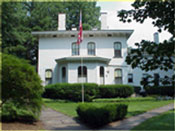

 PO1.1113
PO1.1113
